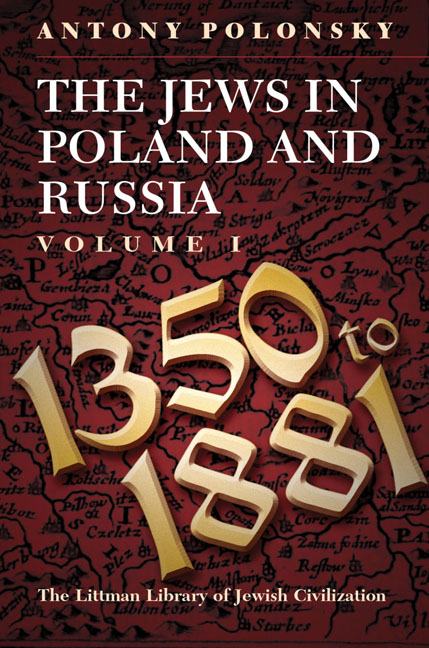Book contents
- Frontmatter
- Dedication
- Acknowledgements
- Contents
- List of Maps
- List of Tables
- Note on Transliteration
- Note on Place Names
- Maps
- General Introduction
- PART I JEWISH LIFE IN POLAND–LITHUANIA TO 1750
- PART II ATTEMPTS TO TRANSFORM AND INTEGRATE THE JEWS, AND THE JEWISH RESPONSE, 1750–1880
- Glossary
- Bibliography
- Index
3 - Jewish Places: Royal Towns and Noble Towns
- Frontmatter
- Dedication
- Acknowledgements
- Contents
- List of Maps
- List of Tables
- Note on Transliteration
- Note on Place Names
- Maps
- General Introduction
- PART I JEWISH LIFE IN POLAND–LITHUANIA TO 1750
- PART II ATTEMPTS TO TRANSFORM AND INTEGRATE THE JEWS, AND THE JEWISH RESPONSE, 1750–1880
- Glossary
- Bibliography
- Index
Summary
The Polish Crown flourishes as it is composed of people of diverse estates, particularly in regard to their religious allegiance, on the principle that no authority shall exercise power over faith, honour, and conscience. We wish therefore to secure a peaceful life especially to those persons who have suffered persecution not because of any crimes or evil deeds, but for other reasons, so that they may enjoy all the liberties of the laws enacted by us.
HIERONIM SIENIAWSKI, Privilege granted to the Jews in Oleszyce, 1576BY THE MID-SEVENTEENTH CENTURY the Jewish community of Poland– Lithuania was the largest in Ashkenaz. A century later it was the largest Jewish community in the world with a population of over three-quarters of a million, and probably made up more than a third of world Jewry. In the two previous chapters the relations between Jews and Christians in Poland–Lithuania and the structure and character of Jewish communal autonomy have been described. This chapter will examine the locations of Jewish life in Poland and Lithuania.
There were four types of location. First, there were royal towns like Krakow, Vilna, Poznań, and Lviv, which were under the jurisdiction of the king or his governor (wojewoda) and, in smaller towns, the starosta. Then there were the ‘suburbs’ (areas outside the town walls not formally under the jurisdiction of the municipality) and jurydyki or libertacje (noble or clerical enclaves) of royal towns. Thirdly, there were the many towns established on the estates of the nobility; and finally there were the villages.
Royal towns were adversely affected by the growing economic and social dominance of the nobility in the Polish–Lithuanian Commonwealth, and in Polish urban history the mid-seventeenth century was not as important a turning point as it was in the realms of politics and culture. The movement of Jews from royal to noble towns had already begun in the late sixteenth century so that, in the words of the Polish economic historian Andrzej Wyrobisz, the seventeenth century in Poland–Lithuania was ‘an age of small towns’, by which he meant noble towns.
- Type
- Chapter
- Information
- The Jews in Poland and RussiaVolume I: 1350 to 1881, pp. 68 - 90Publisher: Liverpool University PressPrint publication year: 2009



